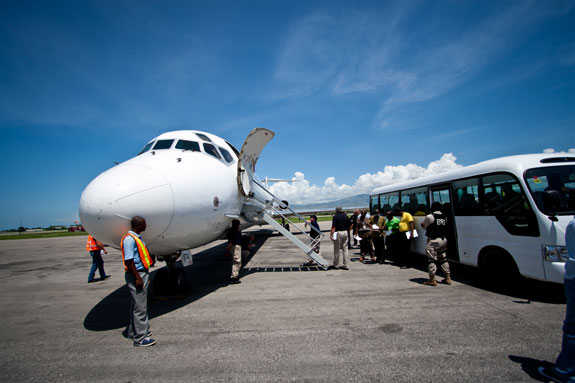
A flight carrying deportees from a Louisiana detention center arrives at Toussaint Louverture International Airport in Port-au-Prince on Sep. 13, 2011. (Photo by Jacob Kushner/FCIR.)
By Jacob Kushner
Florida Center for Investigative Reporting
Despite the Obama administration’s policy to prioritize dangerous criminals for post-earthquake deportations to Haiti, data obtained by the Florida Center for Investigative Reporting shows that nearly one in two Haitians detained by the U.S. government have not been convicted of crimes in the United States.
Of a sample of 260 illegal immigrants returned to Haiti following the January 2010 earthquake, 114 — or 44 percent — did not have criminal convictions, according to the government data FCIR obtained through a Freedom of Information Act request.
What’s more, 39 Haitians who were still in the custody of the U.S. Agency for Immigration and Customs Enforcement as of January 23 did not have criminal convictions, suggesting ICE continues to process non-criminal immigrants.
Immigration officials say they’re not deporting non-criminal immigrants to Haiti. But many who do not have criminal convictions continue to be returned to Haiti by U.S. Customs and Border Patrol or opt to return “voluntarily” to avoid other repercussions.
Meanwhile, ICE has forcibly deported 514 immigrants to Haiti on 13 flights since it resumed deportations in January 2011 — less than one year after Haiti was ravaged by an earthquake and a subsequent cholera epidemic that is believed to have taken the life of at least one deportee.
In November 2011, FCIR reported that many post-earthquake deportees committed only minor crimes, contradicting stated ICE policy to prioritize “serious criminals” who “pose a threat to public safety.” Haitian authorities place about half of the deportees in jails to monitor what they term “serious criminals” — a largely arbitrary determination. These detentions, which have lasted as long as 11 days in overcrowded cells where cholera exposure is a potentially fatal concern, violate Haitian law and United Nations treaties when deportees have not been charged with crimes in Haiti.
Four days after FCIR published its initial investigation, the Department of Homeland Security announced plans to review pending deportation cases in order to close those involving immigrants with no criminal record or a record of minor offenses.
This most recent data confirms FCIR’s earlier findings. In addition to 114 non-criminals, 79 of the 260 Haitians in the sample were immigrants whose crimes were non-violent, meaning their deportations should not have been prioritized under current policy.
